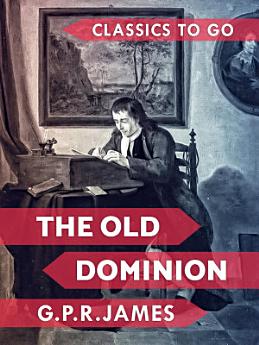The Old Dominion
Aug 2018 · Otbebookpublishing
Ebook
344
Pages
family_home
Eligible
info
reportRatings and reviews aren’t verified Learn More
About this ebook
Excerpt: "I wrote to you, my dear sister, from the pretty little town of Baltimore; and I hope you have received my letter. Although this so speedily follows it, my only motives for writing are, to occupy idle time, and to relieve your mind from apprehension regarding my safety during my passage through all the terrors of Chesapeake Bay: "that long and dreadful inlet," as you call it, "in which uncle Richard was shipwrecked twenty or thirty years ago." Believe me, all these dangers are imaginary. This Chesapeake Bay is a very calm, pleasant sheet of water, which may have its storms sometimes; but, sheltered from the full force of the ocean by what is called the eastern shore, has no terrors after passing the Atlantic."
About the author
George Payne Rainsford James (1799-1860) was a prolific English novelist and historical writer whose works captivated the Victorian era with their vivid storytelling and meticulous historical detail. Born in London, James initially pursued a career in diplomacy, serving as British consul in various European cities, including Norfolk, Virginia, and Venice. His diplomatic career provided him with a wealth of experiences and insights that enriched his literary endeavors.James's literary contributions are notable for their extensive research and commitment to historical accuracy, which set a new standard for historical fiction. He penned over 100 novels, along with numerous short stories, biographies, and historical studies. His works often explored themes of chivalry, honor, and the complexities of human nature, resonating deeply with readers of his time.Despite his popularity, James faced criticism for his formulaic writing style, characterized by the frequent use of stock phrases and predictable plot structures. This led to some contemporary writers, including Charles Dickens, parodying his work. However, James's influence on the genre of historical fiction is undeniable, paving the way for later authors like Sir Walter Scott and Alexandre Dumas.James was also a forward-thinking individual who championed progressive ideas such as social reform and the abolition of slavery. His commitment to these causes is reflected in his writings, which often highlighted social injustices and advocated for a more equitable society.In an era of rapid change and industrialization, G.P.R. James's works offered readers a nostalgic escape into the past while subtly encouraging them to reflect on the moral and social issues of their present. His legacy endures as a testament to the power of historical fiction to both entertain and enlighten.
Rate this ebook
Tell us what you think.
Reading information
Smartphones and tablets
Install the Google Play Books app for Android and iPad/iPhone. It syncs automatically with your account and allows you to read online or offline wherever you are.
Laptops and computers
You can listen to audiobooks purchased on Google Play using your computer's web browser.
eReaders and other devices
To read on e-ink devices like Kobo eReaders, you'll need to download a file and transfer it to your device. Follow the detailed Help Center instructions to transfer the files to supported eReaders.






